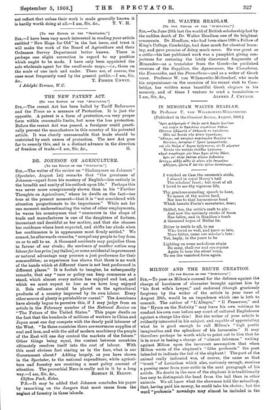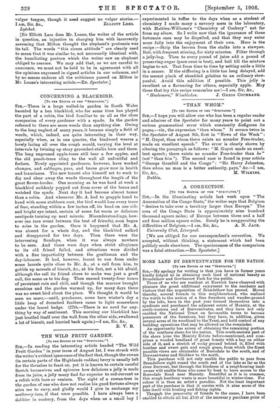MILTON AND THE BRUTE CREATION.
(To TM/ EDITOR OF 7115 "EinecTAToiz."] SIR,—To pose as Milton's counsel for the defence against the charge of harshness of character brought against him by "his first wife's lawyer," and endorsed (though graciously forgiven) by the writer of the article in your issue of August 29th, would be an impudence which one is loth to commit. The author of "L'Allegro," " Ii Penseroso," and the "Hymn on the Nativity" may leave his own writings to conduct his own case before any court of cultured Englishmen against a charge like this ! But the writer of your article is evidently interested in his subject, and capable of appreciating what he is good enough to call Milton's " high poetic imagination and the splendour of his harmonies." It may therefore perhaps be worth while to point out to him that he is in error in basing a charge of " almost inhuman " writing against Milton upon the incorrect assumption that when Milton wrote of the elephant's " lithe proboscis" the poet intended to indicate the tail of the elephant ! The part of the animal really indicated was, of course, the same as that " trunk " of Leviathan which also, curiously enough, receives a passing sneer from your critic in the next paragraph of his article. No doubt in the case of the elephant it is traditionally less easy to distinguish the head from the tail than in other animals. We all know what the showman told the schoolboy, that, having paid his money, he could take his choice ; but the word "proboscis" nowadays may almost be included in the vulgar tongue, though it need suggest no vulgar stories.— [Sir Elliott Lees does Mr. Loane, the writer of the article in question, an injustice in charging him with incorrectly assuming that Milton thought the elephant's proboscis was its tail. The words "this circus attitude" are clearly used to mean that it was similar to, not necessarily identical with, the humiliating posture which the writer saw an elephant obliged to assume. We may add that, as we are careful to announce, we must not be held to be in agreement with all the opinions expressed in signed articles in our columns, and by no means endorse all the criticisms passed on Milton in Mr. Loane's interesting article.—ED. Spectator.]







































 Previous page
Previous page